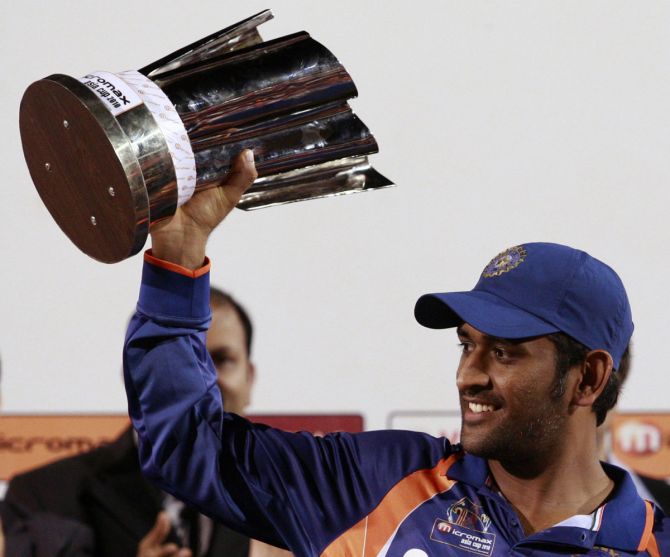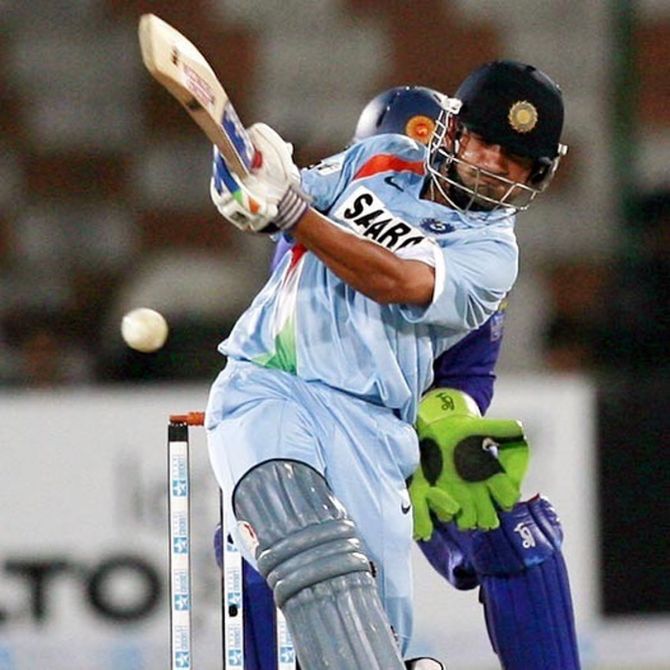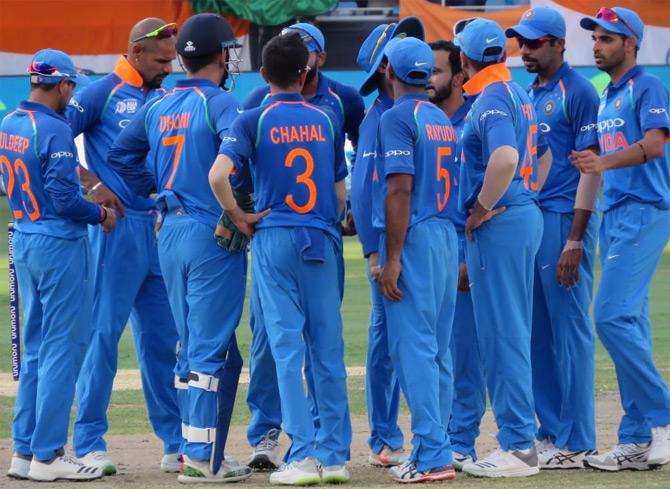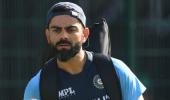Rajneesh Gupta's fascinating insights about the Asia Cup.

The twice postponed Asia Cup will finally commence in the United Arab Emirates on August 27.
The tournament was scheduled to be held in September 2020, but was postponed due to the COVID-19 pandemic. It was then rescheduled to take place in Sri Lanka in June 2021, before being postponed again.
Pakistan were scheduled to host the tournament. In October 2021, the Asian Cricket Council announced that Sri Lanka would host the tournament in 2022, with Pakistan hosting the 2023 edition.
In July 2022, the Sri Lanka Cricket Council informed the Asian Cricket Council that it would not be able to host the tournament due to the prevailing economic and political crisis in the country after which it was moved to the UAE, with Sri Lanka staying as the tournament's hosts.
A total of six teams will be vying for the prestigious Asia Cup title as it returns after a four-year hiatus.
Five Test sides -- India, Pakistan, Sri Lanka, Bangladesh and Afghanistan -- gained direct entry, while Hong Kong came through the qualifiers to complete the line-up.
The teams will have been divided into two groups of three teams each from which the top two teams in each group will advance to the Super Four, with the top two qualifying for the final on September 11.
Group A: India, Pakistan, Hong Kong
Group B: Sri Lanka, Bangladesh, Afghanistan
This year's Asia Cup will be played in the T20 format as a precursor to the T20 World Cup. In 2016, it was decided that the Asia Cup would no longer be a 50 over tournament, but would alternate between the ODI and T20 formats according to the next scheduled ICC event.
Maybe only a few are aware that Asia is the only continent that has enough number of international cricket teams to consist a proper tournament. This factor was spotted by the Asian Cricket Council 38 years ago to promote the game and goodwill amongst Asian nations.
Thus in 1984, the first edition of the Asia Cup took place in Sharjah with India, Pakistan and Sri Lanka playing matches on a round robin league basis.
Overall, India have won the Asia Cup on seven occasions, Sri Lanka on five occasions, with Pakistan winning it twice.
Sri Lanka is the only team to participate in every single Asia Cup tournament.
A look at the past 14 editions of the Asia Cup:

1984 (in UAE): Winner: India, Runner-up: Sri Lanka
Sri Lanka still the minnows of international cricket having obtained Test status barely three years earlier were off to a flier when they beat Pakistan by five wickets in the tournament opener.
Sri Lanka's victory was fashioned out by a classic unbeaten half-century from man of the match Roy Dias which enabled them to top Pakistan's 187 with 39 balls to spare.
Against India in the next game Sri Lanka were shot out for 96 and lost by ten wickets. India went onto clinch the title when they defeated Pakistan by 54 runs in the final league game remaining unbeaten in the tournament.
Wicketkeeper-batter Surinder Khanna emerged as the unexpected star winning the man of the series award after he slammed back-to-back half-centuries against Sri Lanka and Pakistan.
1986 (in Sri Lanka): Winner: Sri Lanka, Runner-up: Pakistan
India was not there to defend their title and in their place Bangladesh entered as the third team and made their debut in the competition.
For the first time independent umpires stood in the ODIs hosted by a full ICC member with Dickie Bird and David Shepherd from England and Mehboob Shah from Pakistan joining local umpires Herbie Felsinger and P W Vidanagamage.
Sri Lanka lost the opening gae by 81 runs to Pakistan, but gained sweet revenge in the final when they reversed the result to win by five wickets.
Pakistan handicapped by a calf strain to their captain Imran Khan who could not bowl in the match failed to defend 191.
Javed Miandad top scored with a patient 67 off 100 balls while Sri Lankan fast bowler Kaushik Amalean captured 4/46.
Sri Lanka powered by half-centuries from Aravinda de Silva and man of the series Arjuna Ranatunga cruised to victory with 7.4 overs to spare.
1988 (in Bangladesh): Winner: India, Runner-up: Sri Lanka
Sri Lanka threatened to sweep all before them when they cruised to the final with three wins in a row, but were brushed aside by India to lose by six wickets.
Sri Lanka failed to post a challenging total after losing four prime wickets to run outs and a score of 176 was made to look pretty easy by man of the series Navjot Singh Sidhu's rapid 76 scored off 87 balls which saw India win by nearly 13 overs to spare.
The series saw Arjuna Ranatunga making his first appearance as Sri Lanka's captain when he led his country against Pakistan after appointed captain Ranjan Madugalle pulled out of the tournament through injury.
1990-91 (in India): Winner: India, Runner-up: Sri Lanka
India hosted the Asia Cup for the first time and won it for the third time defeating Sri Lanka in the final played at Calcutta by seven wickets.
Due to communal violence in India, Pakistan pulled out and in a three-cornered contest the hosts made full advantage of their home turf.
After losing the league game to Sri Lanka by 36 runs, they hit back hard to win the final largely due to a hat-trick by Kapil Dev who dismissed Roshan Mahanama, Sanath Jayasuriya and Rumesh Ratnayake in his sixth and seventh overs.
1995 (in UAE): Winner: India, Runner-up: Sri Lanka
India won the Asia Cup for the fourth time in as many attempts. India, Sri Lanka and Pakistan were tied on points after the preliminary round, but the first two teams qualified by virtue of a better run rate.
For the third successive time India defeated Sri Lanka in the final winning by eight wickets.
Sri Lanka's 230/7 based on Asanka Gurusinha's 122-ball 85 was made to look small by a magnificent third wicket stand of 175 off 184 balls by Navjot Singh Sidhu (84 not out) and skipper Mohammed Azharuddin (90 not out) as India chased down the runs easily with 8.1 overs to spare.
In the preliminary round, India posted a big partnership when Manoj Prabhakar (60) and Sachin Tendulkar (112 not out) contributed 161, the highest opening partnership in Sharjah and against Sri Lanka at that time.
1997 (in Sri Lanka): Winner: Sri Lanka, Runner-up: India
Having lifted the World Cup one year before, Sri Lanka showed they were a force to be reckoned with by beating India at home to win the Asia Cup. They ended India's stranglehold on the Cup since 1988, winning the final by eight wickets.
India paid the penalty of fielding only three front line bowlers as Sanath Jayasuriya (63 off 52 balls) and Marvan Atapattu (84 not out) wiped out more than half the target score of 240 with a stand of 137.
Skipper Arjuna Ranatunga finished the job with an undefeated 62 off 67 balls. A feature of the final was the stunning display of fielding by Sri Lanka which resulted in five marvelous outfield catches.
Sri Lanka proved unbeatable in the tournament winning all their matches and was led admirably by Ranatunga who was named man of the series and given the title Captain Cool by ICC match referee John Reid.
2000 (in Bangladesh): Winner: Pakistan, Runner-up: Sri Lanka
Pakistan was in destructive form as they carried everything before them to win the Asia Cup for the first time. It was the first time that Bangladesh hosted the tournament, but they couldn't make much headway losing all three preliminary round matches.
Yousuf Youhana was in blistering form averaging 147.50. Defending champions Sri Lanka lost twice to Pakistan but convincingly beat Bangladesh and India. Marvan Atapattu was Sri Lanka's dominant batsman but even his brave century in the final failed to stop the rampaging Pakistanis who won by 39 runs.
2004 (in Sri Lanka): Winner: Sri Lanka, Runner-up: India
The Asia Cup for the first time was conducted in two phases and involved two non-Test playing countries Hong Kong and United Arab Emirates although their participation did little of note.
Pakistan began well only to crash out due to an error in net run rate calculation and India came through despite a couple of sluggish displays.
Sri Lanka once again proved dominant at home, defending 228 courtesy of their brilliance in the field and top-class spin bowling from Sanath Jayasuriya and Upul Chandana. Sri Lanka defended a moderate total of 223 very well by restricting India to 203/9.
2008 (in Pakistan): Winner: Sri Lanka, Runner-up: India

Pakistan hosted the ninth edition of the Asia Cup for the first time and nothing could have been more pronounced than Ajantha Mendis's arrival on the international scene.
Mendis bemused and baffled India in the final so much that Skipper Mahendra Singh Dhoni admitted his batters didn't have a clue against the Sri Lankan's spin.
From 76/1 in the 10th over chasing 273, India collapsed to 173 all out giving Sri Lanka a 100 run win and their fourth Asia Cup triumph to equal India's record.
Mendis was the difference with stunning figures of 6/13 runs from his eight overs.
Before Mendis brought humiliation to India, it was their old foe Sanath Jayasuriya who had set the stage for the run chase with a 79-ball century which lifted his team from 66/4 to their final total.
Sri Lanka finished as the best team in the tournament producing the highest wicket-taker (Mendis with 17 at 8.52 apiece), the leading century-maker (Kumar Sangakkara with three) and the leading run-scorer (Jayasuriya with 378).
2010 (in Sri Lanka): Winner: India, Runner-up: Sri Lanka

Sri Lanka topped the qualifying table, but India came up with an excellent all-round performance in the final to win the Asia Cup for the first time since 1995.
They controlled the match from the start, reaching an impressive total of 268 after winning the toss. The top scorer was Dinesh Karthik, who had joined the team mid-tournament after Virender Sehwag tweaked a hamstring.
Sri Lanka's batting, so consistent in the earlier matches, was then swept aside by India's seamers, who used the blustery conditions well to reduce them to 51/5. They could not recover from this disastrous start.
India were the most impressive side in the tournament, even though none of their players topped the batting and bowling charts (Shahid Afridi with 265 runs at 88.33 was the leading run-scorer, while Lasith Malinga with 9 wickets at 14.00 apiece was the leading wicket-taker).
Their league match against arch-rivals Pakistan was the best match of the tournament when Harbhajan Singh hit a six off the penultimate ball of the match to give India a thrilling win by three wickets.
2012 (in Bangladesh): Winner : Pakistan, Runner-up: Bangladesh

India beat Sri Lanka in their opening game and pulled off a mammoth chase against Pakistan in their last game, but their defeat to hosts Bangladesh ruined their chances of making it to the final.
After scoring his 99th international hundred against South Africa in the 2011 World Cup, Sachin Tendulkar had been bogged down with all the hype created about his 100th international century.
He finally reached the landmark against Bangladesh, but took more deliveries than he would have normally taken and this proved detrimental to the team's cause.
At the end of the 30th over India were sitting pretty on 154/1. But they managed only 49 runs in next 10 overs, with Tendulkar moving from 78 to 95 consuming 29 balls. He finally reached the milestone in the 44th over, but his overcautious approach meant that India's final total was imposing rather than impossible.
Bangladesh pulled off their biggest chase against a higher ranked side as almost all their top-order batsmen clicked together.
India's biggest chase against Pakistan -- made possible by Virat Kohli's stunning 183 -- kept their chances alive, but Bangladesh edged them out for the final when they beat Sri Lanka in a rain-affected match. Pakistan and Bangladesh thus qualified for the final.
In the final Pakistan beat Bangladesh by just two runs to lift the trophy, but their win came under controversial circumstances.
Pakistan were reeling at 133/6 in the 35th over, but managed to reach a rather respectable 236/9 thanks to some splendid batting from wicket-keeper Sarfraz Ahmed.
Tamim Iqbal scored his fourth consecutive fifty in the tournament and even though none of the Bangladesh middle-order batsmen lived up to the expectations except Shakib Al Hasan, Bangladesh always remained in the game.
They were left to score nine runs off the last over bowled by Aizaz Cheema. On the first ball of the over Cheema collided with Mahmudullah as he was looking for a second run, but the umpires decided the obstruction was not intentional.
This proved decisive as Mahmudullah lost the strike at the crucial stage. Cheema kept his nerve and it all boiled down to four runs off the last ball. Shahadat Hossain could manage only a leg-bye of it with Mahmudullah at the non-striker end.
Pakistan thus won the match by two runs -- the narrowest win in of Asia Cup history. A complaint was lodged by Bangladesh, but it was rejected by the Asian Cricket Council.
2014 (in Bangladesh): Winner: Sri Lanka, Runner-up: Pakistan

The 12th Asia Cup was played in Bangladesh, with Fatullah and Mirpur being the two venues as Afghanistan entered the fray for the first time. Sri Lanka beat Pakistan in the final to lift the trophy.
Mahendra Singh Dhoni was supposed to lead the Indian team, but he had to miss out due to a side strain and Virat Kohli led the side instead.
India beat Bangladesh convincingly in the first game, with Virat Kohli scoring 136 -- the highest score by a captain in the tournament's history. However, they lost to Sri Lanka in the next game.
The match against Pakistan was a nail-biter. Chasing 246, Pakistan lost their ninth wicket off the first ball of the 50th over still requiring 10 runs. A single by number 11 on the next ball brought Shahid Afridi on strike with the game on his shoulders.
Afridi then hit Ravichandran Ashwin for two consecutive sixes to give Pakistan a thrilling win.
In the next match, Sri Lanka sealed a place in the final by beating Afghanistan -- their third win on the trot. And when Pakistan beat hosts Bangladesh in a high scoring game, they qualified for the final too.
In the final Pakistan made 260/5 in their allotted 50 overs, but Sri Lanka chased it down with 22 balls to spare. Lahiru Thirimanne, who hit a match-winning century in the final, was chosen man of the tournament.
2016 (in Bangladesh): Winner: India, Runner-up: Bangladesh

In 2015, the role of the Asian Cricket Council was reduced by the ICC. It was feared that the Asia Cup would cease to exist, however the ICC chose to continue the tournament with some changes.
The most prominent change was that it would no longer be a 50-over tournament, but would be played in ODI and T20I format on rotation basis based on the respective next world events under the ICC.
As the World T20 2016 was scheduled to start soon after the Asia Cup final, it only made sense that the tournament was played in the T20 format.
Five sides played in the tournament -- hosts Bangladesh, India, Pakistan and Sri Lanka were the usual participants, while the UAE came through the qualifiers.
Bangladesh hosted the tournament for the third consecutive time, with all eleven matches being played at Mirpur, a suburb of Dhaka.
India played like a champion side all through the tournament, winning all their matches. They started their campaign against the hosts, beating Bangladesh comfortably by 45 runs.
In the high-profile game against Pakistan, India dismissed the arch-rivals for a paltry 83 -- their lowest score in a T20I match -- batting first. However, India found themselves in trouble as they were reduced to 8/3, before Kohli took the game away from Pakistan.
India sealed a place in the final by beating Sri Lanka by five wickets as Kohli once again played an important role in the win stroking 56 not out.
The UAE were no match to the mighty Indians and after restricting the UAE to 81/9, India chased down the target in just 10.1 overs -- their biggest win in terms of balls to spare.
Bangladesh reached the final by playing some remarkable cricket. They lost their first game to India, but then beat the UAE and followed it with a win against Sri Lanka -- their first against the island nation in this format, and a narrow win against Pakistan put them in the final.
The final was reduced to a 15 over affair by a massive storm that struck 60 minutes before the toss. It was, infact, no less than a miracle that the ground staff managed to get the game going.
Bangladesh ended with 120/5 in their 20 overs, which was made possible by a 13-ball 33 by Mahmudullah.
India lost Rohit Sharma early, but Shikhar Dhawan stayed on and put on 94 runs for the second wicket. With 19 runs required off two overs, the crowd were behind the home side, but M S Dhoni finished the game before the 14th over ended, hitting Al-Amin for one four and two massive sixes. The second six gave India their sixth trophy in the Asia Cup.
Bangladesh's Sabbir Rahman was picked as man of the tournament.
2018 (in UAE): Winner: India, Runner-up: Bangladesh

The tournament was scheduled to be played in India, but had to be shifted to the UAE due to the political tension between India and Pakistan. The tournament's format was back to the 50-overs format.
The five Test teams from Asia were joined by Hong Kong, who won the qualifier tournament. The teams were divided in to two groups -- with India, Pakistan and Hong Kong in Group A, and Afghanistan, Bangladesh and Sri Lanka in Group B. The top two teams from two groups would then compete in the Super 4 stage.
India qualified for the Super 4 as Group A leaders. The high profile India vs Pakistan game was a totally one-sided affair as India registered their biggest win (in terms of ball remaining), reaching the 163-run target in just 29 overs. Pakistan made it to the Super 4 by beating Hong Kong quite comfortably.
In the first match of Group B, Sri Lanka suffered a heavy defeat against Bangladesh (by 137 runs). Afghanistan then handed Sri Lanka another big defeat (by 91 runs). Afghanistan qualified as Group B leader when they beat Bangladesh by 136 runs.
In the Super 4, India first beat Bangladesh by seven wickets and then trounced Pakistan by nine wickets.
Rohit and Dhawan's partnership of 210 was India's highest -- while batting second, against Pakistan and in their Asia Cup history -- for the first wicket. They ended as the top team in the Super Four, to advance to the final.
Pakistan's loss to Bangladesh -- their first ever in Asia Cup -- saw Pakistan eliminated and Bangladesh reaching the final. However, it was Afghanistan, who were really unlucky to lose out.
They had a string of close games -- a three-wicket loss to Pakistan, followed by a three-run loss to Bangladesh and a tied game vs India (all three games were decided in the last over).
The final turned out to be a humdinger as the match went down to the last ball. Bangladesh batted first and although eight of their batters could not cross seven, they finished with 222 riding on Litton Das' 121 off 117 balls.
None of the Indian batters scored a fifty, but there were many useful contributions keeping India in the game. India needed six runs off the last over, with Kedar Jadhav and Kuldeep Yadav at the crease.
It boiled down to two off last two balls and then one off one. Jadhav missed putting bat to the ball, but managed to scamper for a leg-bye that gave India their seventh Asia Cup triumph.











